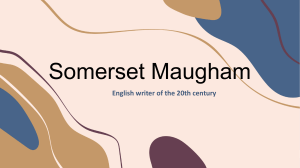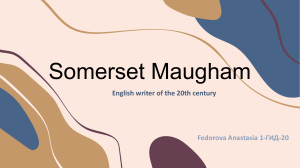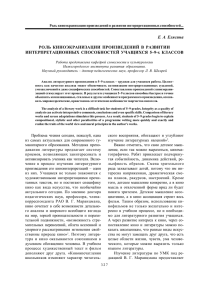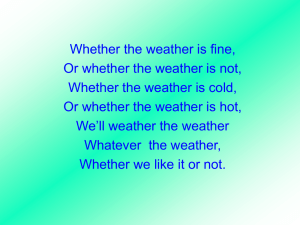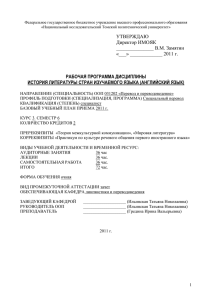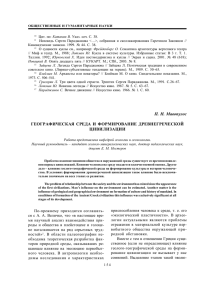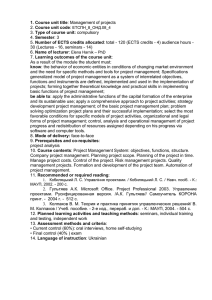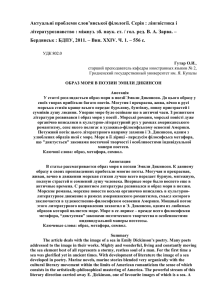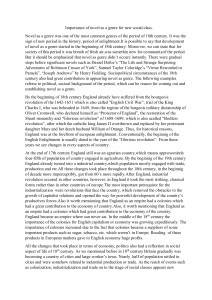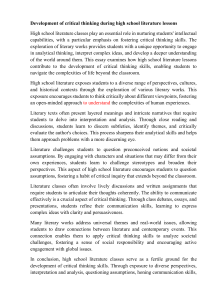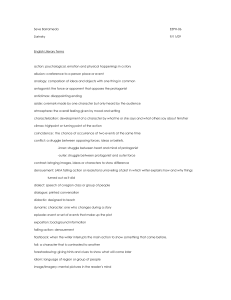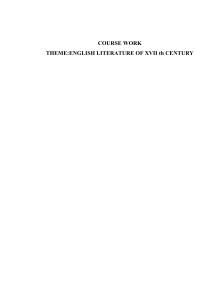Министерство образования и науки РФ Государственное образовательное учреждение высшего профессионального образования
реклама
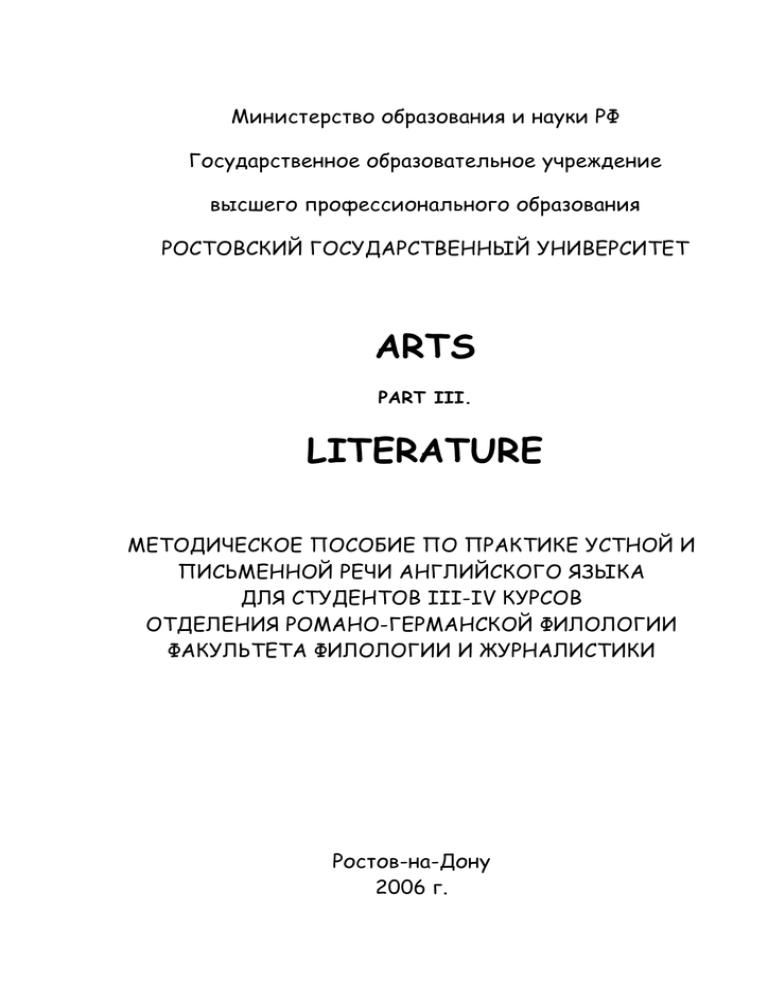
Министерство образования и науки РФ Государственное образовательное учреждение высшего профессионального образования РОСТОВСКИЙ ГОСУДАРСТВЕННЫЙ УНИВЕРСИТЕТ ARTS PART III. LITERATURE МЕТОДИЧЕСКОЕ ПОСОБИЕ ПО ПРАКТИКЕ УСТНОЙ И ПИСЬМЕННОЙ РЕЧИ АНГЛИЙСКОГО ЯЗЫКА ДЛЯ СТУДЕНТОВ III-IV КУРСОВ ОТДЕЛЕНИЯ РОМАНО-ГЕРМАНСКОЙ ФИЛОЛОГИИ ФАКУЛЬТЕТА ФИЛОЛОГИИ И ЖУРНАЛИСТИКИ Ростов-на-Дону 2006 г. Методическое пособие обсуждено и утверждено на заседании кафедры английской филологии факультета филологии и журналистики Ростовского государственного университета Протокол № 1 от 31 августа 2006 г. Составитель кандидат филологических наук М. В. Окс Рецензент кандидат филологических наук И. М. Полякова Ответственный редактор доктор филологических наук С. Г. Николаев Данное методическое пособие предназначено для изучения на старших курсах студентами отделения английской филологии. Настоящее пособие, посвященное теме «Литература», является третьей частью комплекса по теме «Искусство», наряду с двумя другими частями, посвященным темам «Живопись» и «Музыка». Пособие нацелено на совершенствование навыков устной и письменной речи и расширение словарного запаса по предложенной теме. Основной целью настоящего пособия является развитие и совершенствование неподготовленной, спонтанной речи, способности аргументировано излагать свою точку зрения, принимать участие в дискуссии. Также важное место в пособии отводится развитию навыков перевода текстов с русского языка на английский. Настоящее методическое пособие отражает принцип взаимосвязанного, комплексного обучения различным видам деятельности: чтению, говорению, аудированию, письму и переводу. Пособие открывается структурированным лексическим списком по теме «Литература», помимо специальной терминологии в список включены закрепившиеся в словарях варианты перевода наиболее известных художественных произведений. Разнообразные лексические упражнения способствуют усвоению и закреплению нового материала. Публицистические тексты составляют основную часть пособия. Следующие за ними задания направлены на проверку понимания содержания текста и закрепление изученного вокабуляра. Важное место в пособии отводится письменным заданиям: письменные переводы, сочинения-рассуждения способствуют развитию навыков связанно и аргументировано излагать свои мысли на письме, а также орфографически и пунктуационно правильно оформлять письменную речь. Данное методическое пособие может представлять интерес для студентов, аспирантов, а также все тех, кто углубленно изучает английский язык. 2 CONTENTS Lead-in………………………………………………………………………………………………………………………….4 Topical vocabulary …………………………………………………………………………………………………….5 Vocabulary exercises…………………………………………………………………………………………………11 Speaking ………………………………………………………………………………………………………………………17 Reading. Text 1 ………………………………………………………………………………………………………….18 Listening and speaking……………………………………………………………………………………………….21 Translation ……………………………………………………………………………………………………,……………23 Writing ………………………………………………………………………………………………………...................24 Appendix……………………………………………………………………………………………………………………….25 Bibliography…………………………………………………………………………………………………………………28 3 LEAD-IN The people in the pictures are all characters from English literature. Who are they? Which books are they from? What are they famous for? 4 TOPICAL VOCABULARY KINDS OF PRINTED MATTER atlas - атлас booklet - буклет brochure - брошюра catalogue - каталог dictionary - словарь directory - справочник encyclopaedia - энциклопедия gazetteer - 1) географический справочник 2) (устар.) журналист, газетный работник guidebook - путеводитель hardback - книга в твердом переплете leaflet листовка; тонкая брошюра manual – инструкция, руководство; наставление; справочник, указатель; учебник paperback - книга в бумажной обложке phrase-book - разговорник prospectus – проспект учебного заведения, компании textbook - учебник thesaurus – 1)словарь; справочник, энциклопедия 2) идеографический словарь, тезаурус Who’s Who - 1) "Кто есть кто" (название справочника, содержащего биографическую информацию о современниках ) 2) видные деятели Yellow Pages - "Желтые страницы" (справочник с информацией самого широкого характера об организациях, учреждениях и предприятиях, распределенных по тематическим областям, географическому принципу и т.д.) PARTS OF A BOOK appendix - приложение bibliography - библиография binding - переплет blurb – рекламный текст на обложке chapter - глава concordance – алфавитный указатель contents - содержание cover - обложка, переплет; одна сторона обложки to read from cover to cover — прочесть от корки до корки ( о книге ) cover shoot обложки журнала — фотография с Don't judge a book by its cover. — Не суди о книге по ее обложке. cross-reference - перекрестная ссылка epigraph – эпиграф epilogue - эпилог foreword – предисловие, написанное автором index - алфавитный указатель; каталог motto – эпиграф preface - предисловие; вводная часть; введение, вступление; преамбула (часто написанное издателем) prologue - пролог title - название KINDS OF LITERATURE anthology – антология autobiography - автобиография ballad - баллада ballade – баллада, форма лирического стихотворения (классическая французская баллада состоит из трех строф с рефреном и посылкой) 5 художественная проза, беллетристика bestiary – животный эпос bucolic – 1) буколика, буколическое произведение, 2) буколический писатель burlesque – бурлеск, пародия canto – песнь comedy of manners – комедия нравов commentary (-ies) - комментарий belle lettres – confessional literature – автобиографическая литература couplet – куплет, двустишие criticism – 1)критика (анализ, истолкование и оценка литературных и художественных произведений) 2) критический отзыв, критическая статья; рецензия detective story / novel – детективный рассказ / роман diary - дневник dithyramb – дифирамб doggerel – доггерель (плохие стихи, «вирши») drama – 1) пьеса 2) драматический жанр 3) драма dramatist, dramaturge, dramaurgist - драматург dystopia – дистопия, антиутопия elegy - элегия epic - эпос epigram – эпиграмма epistolary literature – эпистолярная литература epitaph - эпитафия epos - эпос essay - очерк, эссе fable - басня fabliau - фаблио fairy tale - сказка feuilleton - фельетон fiction – художественная литература, беллетристика folklore - фольклор Gothic novel – готический роман, роман ужасов heroic play -героическая пьеса historical play – историческая пьеса homily - поучение humorous anecdote - анекдот idyll - идиллия incantation - заклинание, магическая формула jest book – сборник анекдотов lament – элегия, похоронная песнь lampoon – памфлет, пасквиль lay – сказ legend - легенда letter - письмо lexicon - словарь light verse – шуточное стихотворение limerick – лимерик, шуточнобессмысленное стихотворение love songs – любовная песнь low comedy – комедия-фарс lullaby - колыбельная lyric – лирическое стихотворение lyrics - 1) лирические стихи, лирика 2) слова популярной песни mock epic – пародия на эпическое повествование myth - миф novel - роман novelette – повесть novella – новелла nursery rhymes - детские стишки; прибаутки ode - ода pamphlet - памфлет pasquinade – пасквиль 6 pastiche литературная литературная – стилизация, мистификация picaresque – плутовской роман proverb - пословица riddle - загадка romance – 1) рыцарский роман, 2) легковесный, фабульный роман или повесть, 3) романс saga - сага science fiction — фантастика sentimental comedy – сентиментальная комедия short story - рассказ sketch – 1) скетч, 2) очерк skit-шуточное, юмористическое произведение, пародия slapstick – грубый юмор slapstick comedy – грубый фарс squib – пасквиль, шутка story – 1) повесть, 2) рассказ 3) сюжет story of make-believe – повестьсказка tale - повесть tragedy – трагедия tragedy of revenge – трагедия возмездия tragicomedy – трагикомедия travel journal – путевой журнал trilogy – трилогия utopia - утопия verse – 1) стихотворение, 2) строка blank verse – белый стих ‘TO WRITE’ & ITS SYNONYMS to annotate–1) аннотировать2) комментировать, примечаниями to autograph давать автограф снабжать - надписывать, to edit - редактировать, готовить к печати 1) надписывать, вписывать(in, on; for); 2) ставить автограф или надписывать (кому-л. на память) to jot (down)- кратко записать, бегло набросать; записать to note (down)- делать заметки, записывать to print – 1)издавать, отдавать в печать 2) отпечатывать(ся) to be out of print – больше не издаваться print (n) -шрифт small (large, close) print — мелкая (крупная, убористая) печать to publish - издавать, опубликовывать to scrawl - 1) писать наспех; писать неразборчиво 2) писать каракулями, закорючками to scribble - писать быстро и небрежно to sign - подписывать(ся), ставить подпись to spell - писать или произносить (слово) по буквам to type - писать, печатать на машинке to write - писать handwriting – почерк write shorthand – стенографировать to write out fair — написать начисто in block capitals – печатными заглавными буквами to inscribe– WRITERS, PUBLISHERS & READERS best-seller - бестселлер best-seller list – список бестселлеров bookshop – книжный магазин copy - экземпляр copyright - авторское право copyright reserved - авторское 7 право сохранено (перепечатка воспрещается) edition - издание Laureate, poet official national Laureate (the poet) - поэт, награжденный за заслуги mass readership – массовый читатель men of literary letters /litterateur / man литератор, писатель, автор, сочинитель nom de guerre / nom de plume / pen-name / pseudonym - литературный псевдоним to adopt a pseudonym — взять псевдоним to use a pseudonym пользоваться псевдонимом — to write under a pseudonym — писать под псевдонимом plagiarism, plagiary – плагиат playwright – драматург PLR (Public Lending Right) - право на доход от выдачи книг из библиотеки (зарегистрированным авторам выплачивается из государственных средств ежегодная сумма денег по мере выдачи их книг из определённых публичных библиотек; схема была введена правительством в 1984 ) public library – публичная библиотека publisher - издатель publishing house - издательство research materials – научные материалы royalties – авторский гонорар the Booker prize – премия Буккера, Букеровская премия (ежегодная литературная премия в 20.000 за лучший роман, изданный впервые в Англии английским издательством; присуждается Книжным трестом [Book Trust]) учреждена фирмой "Букер" [Booker plc] to bowdlerize – выбрасывать из книги все нежелательное, кажущееся непристойным; делать купюры to edit / to redact - подвергать редакции to publish - издавать, опубликовывать бегло to scan (through) просматривать текст в поисках определенной to skim (through, over) - поверхностно знакомиться ( с чем-л. ), бегло просматривать to take out – брать (книгу из библиотеки) DESCRIBING A LITERARY PIECE abstract – краткое содержание, резюме carefully drawn, rounded characters – тщательно выписанные, реалистичные персонажи character (incidental)–персонаж (эпизодический) – изображение character writing персонажей content and form – содержание и форма didactic – дидактический, нравоучительный denouement – развязка dominant theme – основная тема human foibles – человеческие слабости imagery – образность, система образов inner monologue – внутренний монолог interlude – интерлюдия, интермедия intrigue - интрига invocation – обращение 8 leitmotif, -iv - лейтмотив local colour – местный колорит milieu – среда литературного произведения narrative - повествование pithy – сжатый, лаконичный plot - фабула poetic prose – поэтическая простота poetic(al) justice – «порок наказан, добродетель торжествует» potboiler – низкопробное произведение, халтура précis – резюме prologue – пролог protagonist – главный герой questions of a metaphysical nature – метафизические вопросы repartee – остроумный, находчивый ответ setting – 1) место действия, 2) атмосфера, настроение slice of life – натуралистическое описание soliloquy – монолог, разговор с самим собой story within a story – вставная новелла, рассказ в рассказе stream of consciousness – поток сознания subject – тема subplot – вторая линия сюжета suspense – напряжение неизвестности the common man – простой, обычный человек theme – тема to explore the fate of the individual – исследовать судьбу отдельного человека to glorify combat – прославлять борьбу to seek vitality (in) – искать источник жизни в… to study man’s search for merit and worth in his life – изучать поиски человеком смысла жизни unities of time, place , and action – единство времени, места и действия verbose – многословный verbosity - многословие vernacular – народный, местный villain – злодей vision – поэтическое видение women’s inner experience – внутренние переживания женщин STYLISTIC DEVICES acrostic – акростих allegory – аллегория alliteration – аллитерация allusion – аллюзия, поэтический намек ambiguity – двусмысленность anaphora – анафора anticlimax – разрядка antithesis – антитеза, противопоставление aphorism – афоризм, сентенция apokoinou – апокойну aposiopesis – умолчание, недосказ archaism – архаизм aside – реплика в сторону bathos – переход от высокого к обыденному, комическому cue – реплика discord – несоответствие, отсутствие гармонии emphasis - выразительность, сила, ударение; эмфаза emphatic inversion – стилистическая инверсия euphemism - эвфемизм flash-back – ретроспективное 9 описание, обращение к прошлому framing - обрамление half-reported speech – несобственно прямая речь neologism – неологизм pun – каламбур LITERARY MOVEMENTS – ЛИТЕРАТУРНЫЕ ТЕЧЕНИЯ Abolitionism – Аболиционизм Acmeism - Акмеизм Classicism - Классицизм Decadence – Декаданс Elizabethan literature – литература елизаветинского периода Enlightenment Просвещения – эпоха Existentialism – экзистенциализм Expressionism – экспрессионизм Feminism - феминизм Graveyard school poetry – «Кладбищенская поэзия» Humanism - гуманизм Impressionism - импрессионизм Modernism – модернизм Naturalism натурализм (grim naturalism) Little Red шапочка Riding Hood Красная – The Golden Cockerel – Золотой петушок The Magic Humpbacked Horse – Конек- горбунок The Magic Pike – По щучьему велению The Princess and the Pea – Принцесса на горошине Tom Thumb – Мальчик-с-пальчик Wash’em Clean - Мойдодыр RUSSIAN CLASSICS A Busy Place – На бойком месте Dead Souls – Мертвые души Eugene Onegin – Евгений Онегин Guilty though Guiltless / Guilty with No Guilt – Без вины виноватые In the World - В людях Insulted and Injured – Униженные и оскорбленные My Past and Thoughts – Былое и думы Notes from the Underground – Записки из подполья – Neo-classicism – неоклассицизм Neo-Romanticism - неоромантизм Pre-Raphaelites – прерафаэлиты Pre-Romanticism – предромантизм Realism - реализм Renaissance - Возрождение Romanticism - Романтизм Sentimentalism – сентиментализм Surrealism – сюрреализм SOME FAMOUS BOOKS CHILDREN’S BOOKS Baba Yaga, Fairy-Tale Witch – Баба Яга Цокотуха Big Bad Wolf – Серый волк Busy Bustling Bluebottle – Муха- Old-World Landowners – Старосветские помещики Poor Folk – Бедные люди Quiet Flows the Don / The Silent Don – Тихий Дон The Bronze The Brothers всадник Карамазовы Horseman Karamazov Медный – – Братья The Cherry Orchard – Вишневый сад The Gulag Archipelago – Архипелаг Гулаг The Idiot - Идиот The Inspector General - Ревизор The Life of Protopriest Avvakum – Житие протопопа Аввакума The Living Corpse – Живой труп The Lower Depths – На дне 10 The Minor - Недоросль The Portionless Girl Бесприданница The Possessed - Бесы The Prisoner of the Caucasus – Кавказский пленник The Queen of Spades – Пиковая дама The Resurrection - Воскресение The Road to Calvary – Хождение по мукам The Song of Oleg the Wise – Песнь о Вещем Олеге The Sorm - Гроза They fought for Their Fatherland – Они сражались за родину Too Clever by Half – На всякого мудреца довольно простоты Virgin Soil Upturned - Поднятая целина FOREIGN CLASSICS All ‘s Well That Ends Well – Конец – делу венец As You Like It – Как вам это понравится Cabal and Love – Коварство и любовь Don Quixot – Дон Кихот Romeo and Juliet – Ромео и Джульетта The Constant Wife – Верная жена The Merchant of Venice – Венецианский купец The Merry Wives The Pickwick of Виндзорские насмешницы Papers Пиквикского клуба The School злословия for Windsor Записки – Scandal – – Школа The Taming of the Shrew – Укрощение строптивой The Winter’s Tale – Зимняя сказка Two Gentlemen of Verona – Два веронца VOCABULARY EXERCISES Ex. 1. WAYS OF WRITING. Match the following verbs describing various ways of writing with their definitions on the right. a) to autograph b) to compose c) to inscribe d) to jot e) to note f) to print g) to scrawl h) to scribble i) to sign j) to spell k) to transcribe l) to type m) to annotate 1) to put something into a written form, e.g. a speech 2) to write carelessly or in a hurry so that it is hard to read 3) to write using a typewriter 11 4) to write in an irregular, awkward, or unskillful way, usually covering more space than necessary 5) to add short notes to explain certain parts of a book, etc. 6) to write using square, unjoined letters; also used in books 7) to sign with one's own name to show that one is the writer of a book, etc. 8) to write a name in a book, especially when giving it as a present 9) to write rough notes quickly, without preparation 10) to write in a short form 11) to write one's name specially, on letters, official forms, etc. 12) to form words correctly from letters 13) to write music, poetry, etc. Ex. 2. WAYS OF WRITING. Fill in the following sentences using the verbs describing various ways of writing. 1) He………..…. some notes for the talk he had just been asked to give after the dinner. 2) There was a name ………………….on the wall. 3) Will you …………………. your new book for me, please? 4) My name is ………………….. B-R-O-W-N not B-R-A-W-N. 5) Please …………………… your address clearly in block capitals. 6) His name was ……………….. on a metal plate beside the door. Ex. 3. BOOKS. Match each kind of book with what you would normally expect to find in it. atlas autobiography dictionary directory ' encyclopedia gazetteer guidebook manual textbook thesaurus Who's Who a) basic coursebook at school or university b) information about subjects in alphabetical order c) lists of words grouped according to their similarity in meaning d) maps e) a list of names of places printed at the end of an atlas f) a list of important, famous people and brief details of their lives g) meanings of words h) tourist information about a country i) instructions on how to use or repair a machine j) a list of names, addresses and telephone numbers in alphabetical order k) the story of one's own life written by oneself Ex. 4. BOOKS. Choose the right answer. 1. I don't like reading history or biographies; I prefer……………….myself. a) description b) fiction c) invention d) narration 12 2. That book has been out of……………… for a long time. a) copy b) press c) print d) publication 3. You have to pay a ……………….. if you do not return your library books on time. a) fee b) fine c) penalty d) tax 4. Most of the poet's earlier work was published under a ………………. . a) misnomer b) namesake c) nickname d) pseudonym 5. His new book received good …………………. from the critics. a) comprehension b) flavours c) reviews d) understanding 6. He bought the book for half price because its ……………….. was torn. a) coat b) coating c) cover d) skin 7. I have just read a lovely ……………… about a man who devoted his life to monkeys. a) fiction b) history c) production d) story 8. The first ……………….. of a book can sometimes be very valuable. a) copy b) edition c) title d) type 9. Ms Original had a little in ………………. with other authors of her generation. a) common b) everyday c) normal d) ordinary 10. That author has written a fictional . …………………….of his wartime experiences. a) account b) novel c) story d) tale 11. This is a good…………………………of his delight in unusual words and phrases. a) case b) example c) expression d) passage 12. I can't read this book without my glasses. The……………….is too small. a) handwriting b) letter c) print d) typewriter 13. Ask the publishers to send you their latest…………………..of English text-books. a) booklet b) catalogue c) index d) prospectus 14. I'm reading a book about ……………….of Henry VIII. a) the existence b) the life c) the living d) the road 15. The printing of the book has been held up by the paper…………………… a) deficit b) lack c) scarce d) shortage 16. The essayist, John Cardinal Newman, was one of the most distinguished men of………………of his time. a) books b) letters c) publications d) writings 17. In your criticism of this work, I think you have done less than …………………. to the originality of his style. a) appreciation b) approval c) justice d) praise 18. Because Shakespeare mainly wrote plays, he is usually regarded as …………………… a) an author b) a dramatist c) a novelist d) a writer 19. He knows most of Wordsworth's poems by ……………………. a) head b) heart c) memory d) mind Ex. 5. BOOKS. Divide the following words into four groups. 1. Kinds of printed matter 2. Handwritten matter 13 3. Reference books 4. Kinds of poems Some words may belong to more than one group. atlas couplet elegy lexicon manuscript scroll ballad dictionary encyclopaedia limerick ode sonnet brochure directory hardback lyric pamphlet thesaurus catalogue draft leaflet nursery rhyme paperback Ex. 6. BOOKS. Match the description with the names of parts of a book. 1. appendix 2. bibliography 3. binding 4. blurb 5. chapter 6. contents 7. cross-reference 8. epilogue 9. foreword 10. index 11. instalment 12. preface 13. prologue a) the cover of a book b) a short description by the publisher of the contents of a book, printed on its paper cover c) an introduction to a book d) a preface, especially in which someone who knows the writer and his work and says something about them e) an introduction to a play , long poem f) one of the main divisions of a book, usually having a number or a title g) one part of a book, which is read on the radio in regular parts until the story is completed h) a list of what is contained in the book i) the end of a book, giving additional information j) a list of all the writings used in the preparation of a book k) a list at the back of a book giving, in alphabetical order, names, subjects, etc. mentioned in it and the pages where they can be found. l) a note directing the reader from one place in a book to another place in the same book m) a part of a story, play, etc. that is added after the end, usually a kind of summing-up Ex. 7. BOOKS. Complete with the right name of the part of a book. 1. This old book is …………………. in leather. 2. Look at the list of the ………………in the book and find on which ……………. the first …………….starts. 3. He wrote a ………………….to his book, explaining why he had written it. 4. He listened to the fourth…………………..of the novel on the radio last night. 5. This is a ……………………….of all the works published by Oxford University Press in the past fifty years. 14 6. In this book ………….are shown with an asterisk (*). Ex. 8. BOOKS. Choose the right answer. 1. This book is too ……………………, I don’t understand it. a) blank b) dark c) obscure d) secret 2. In Mr Critical’s opinion, Mary’s reputation as a writer is very …………………………. . a) overestimated b) overlooked c) overrated d) overstated 3. The bookshop said they did not have the drama just then, but that it was on …………………. . a) arrival b) delivery c) order d) purpose 4. Don’t read all the book. Just ………………. the first few pages quickly. a) dissect b) glance through c) look round d) see into 5. A poet has to be extremely ………………… to the music of words. a) alert b) sensible c) sensitive d) sentimental 6. Shakespeare’s plays fall into three ………………… categories: tragedies, comedies and histories. a) ample b) broad c) expansive d) thick 7. The peace of the public library was ………………. by the sound of a transistor radio. a) demolished b) fractured c) smashed d) shattered 8. If he didn’t have the royalties from his book to………….his tiny income, he simply wouldn’t survive. a) amplify b) contribute c) expand d) supplement 9. This young author has already received the sort of…………………. that many who are older and wiser have had to strive a lifetime for. a) attentiveness b) note c) notoriety d) recognition 10. The story had a macabre ………………to it. a) clang b) noise c) ring d) tick 11. He was a learned man, and few travelers have written with so much …………………. . a) acquisition b) apprehension c) cultivation d) erudition 12. His reputation has been greatly ……………… by the success of his new book. a) enhanced b) enlarged c) expanded d) heightened 13. Some writers take a light weight ………. typewriter with them wherever they go. a) bearable b) carrying c) portable d) weighing 14. He says he would write an English course book if he could find a(n) ……………..to deal with the less interesting parts. 15. I was in no way prepared for the ………………. of criticism my play received. a) assault b) offensive c) onset d) onslaught Ex. 9. Look up and memorize the pronunciation of the following names: Aldington, Richard Balzac, Honoré de Brecht, Bertolt Brontë (Charlotte, Emily, Ann) Byron, George Gordon Dickens, Charles 15 Dreiser, Theodore Faulkner, William Fitzgerald, Francis Scott Galsworthy, John Greene, Graham Hemingway, Ernest Miller Henry, O. Irving, Washington Lewis, Sinclair Maugham, William Somerset Murdoch, Iris Poe, Edgar Allan Rabelais, François Shakespeare, William Ex. 10.Match the name of a literary movement or phenomenon with the right definition. 1. Existentialism 2. Expressionism 3. Modernism 4. Naturalism 5. Neo-classicism 6. Sentimentalism 7. Surrealism 8. Victorians a) a conventional term applied to the English writers who lived and worked in the so-called Victorian age (18371901) b) a philosophical movement embracing the view that the suffering individual must create meaning in an unknowable, chaotic, and seemingly empty universe c) a trend in English literature which appeared in the 50s of the 20th century as a result of disillusionment in post-war bourgeois reality. The writers of the trend criticize the contemporary society, but do not show the way out of the impasse. The main representatives of this trend are Kingsley Amis, John Braine, John Osborne, John Wain d) Post-World War I artistic movement, of German origin, that distorted appearances to communicate inner emotional states e) an idealistic theory based on the belief that art does not depend on social life, and that merely form, not content, is important f) International cultural movement after World War I expressing disillusionment with tradition and interest in new technologies and visions g) a term applied to a group of poets (E. Elliot, Th. Cooper, E. Jones), connected with the Chartist movement (the 30’s and the 40’s of the 19th century). Their poetry reflected the revolutionary struggle of the English working class. h) Late 19th- and 20-th century literary approach of French origin that vividly depicted social problems and viewed human beings as helpless victims of larger social and economic forces 16 9. Angry Young Men 10.Art for art’s sake 11.Chartist poets 12.Ivory tower 13.Lake Schhool, Lake poetry 14.University wits i) The term is a translation loan from French (tour d’ivoire), where it was coined by an outstanding writer and literary critic Charles-Augustin Sainte-Beuve to denote aloofness from life, withdrawal from all social concerns. Such literary works as Salome by Oscar Wilde, or the poetry of the Pre-Raphaelites render the atmosphere implied by the term j) an 18th-century artistic movement, associated with the Enlightenment, drawing on classical models and emphasizing reason, harmony, and restraint k) The term applied to three English poets, Southey, Coleridge, and Wordsworth, who had been living for some time in a remote corner of North-West England. They underwent evolution in their political views and creative activities. Aloofness from the life of their time, their plunging into mysticism made their poetry somewhat vague and abstract despite its high artistic values. l) a literary movement of the second half of the 18th century brought to life as a reaction to classicism. It marked a new stage in the evolution of the Enlightenment. The belief in the values of reason being shattered, the emotional tendencies became accentuated. m) European literary and artistic movement that uses illogical, dreamlike images and events to suggest the unconscious n) The name given to a group of Elizabethan playwrights who, being highly educated for the time, brought the English drama to a higher level, thus paving the way for Shakespeare. J. Lyly, G. Peele, Th. Lodge, Th. Nashe, R. Greene, Th. Kyd, Ch. Marlowe are usually referred to as University wits. SPEAKING 1. How much reading do you do? How much time do you spend each week reading books, newspapers and magazines? 2. What kid of books do you enjoy reading? Do you choose different books for different occasions (journeys, holidays, etc.)? 3. If you could choose between reading a book or seeing the same story as a film in the cinema or serialized on TV, which would you prefer? 17 4. Who are your favourite authors? Describe the kinds of books they write. 5. Describe one book you have particularly enjoyed reading recently. What did you like about it? What were its faults? 6. Are there any books you’d like to re-read (or have reread)? READING TEXT 1. Matching stories Here are the opening and closing paragraphs of five different books. There is an autobiography, a detective story, a romance, a spy story, and a fairy story. Read them carefully and match them up. 1 I was born on 16 April 1889, at eight o'clock at night, in East Lane, Walworth. Soon after, we moved to West Square, St George's Road, Lambeth. According to Mother my world was a happy one. Our circumstances were moderately comfortable; we lived in three tastefully furnished rooms. One of my early recollections was that each night before Mother went to the Theatre, Sydney and I were lovingly tucked up in a comfortable bed and left in the care of the housemaid. 2 'I wouldn't marry you if you were the last man left on earth!' Netta faced him defiantly, a tiny figure shaking with outrage, her spirit as fiery as the colour of her copper curls. 'The feeling's mutual,' he snapped back through tight lips. 'Don't imagine I enjoy the prospect of being saddled with you for a wife, for however short a time it maybe.' 'Then let's forget the whole crazy idea.' 3 At the palace, the King was glad to welcome his son's bride. He arranged a magnificent wedding for the Prince and his chosen wife. The kings and queens and the princes and princesses from many lands came to the wedding. The wedding feast lasted a whole week. And they all lived happily ever after. 4 With such happiness, I sometimes sit out on our terrace at sunset and look over a vast green lawn to the lake in the distance, and beyond the lake to the reassuring mountains, and in this mood think of nothing, but enjoy their magnificent serenity. 5 Once upon a time there was a little girl called Cinderella. Her mother was dead, and she lived with her father and two elder sisters. Cinderella's sisters were beautiful and fair of face, but because they were bad-tempered and unkind, their faces grew to look ugly. They were jealous of Cinderella because she was a lovely child, and so they were often unkind to her 6. When I have finished writing, I skill enclose this whole manuscript in an 18 envelope and address it to Poi rot. And then - what shall it be? Verona)? There would be kind of poetic justice. Not that I take any responsibility for Mrs Ferrars' death. It was the direct consequence с her own actions. I feel no pity for her. I have no pity for myself either. So let it be veronal. But I wish Hercule Poirot had never retired from work and come here to grow vegetable marrows. 7. Castle, ever since he had joined the firm as a young recruit more than thirty years ago, had taken his lunch in a public house behind St James's Street, not far from the office. If he had been asked why he lynched there, he would have referred to the excellent quality of the sausages; he might have preferred a different bitter from Watney's, but the quality of (he sausages outweighed that. He was always prepared to account for his actions, even the most innocent, and he was always strictly on time. 8. 'You didn't let me tell you how lovely you look,' he murmured after a long, sweet time had passed between them. 'I tried to tell you, when you joined me in the ballroom tonight, but you thought I was going to say you were late coming down.' He laughed softly at the memory; and she joined in gaily. She had been wonderfully, blissfully on time. She started to tell him so, but his lips claimed her own, masterfully silencing the words that no longer needed to bespoken. 9. Mrs Ferrars died on the night of the I6th-17th September- a Thursday. I was sent for at eight o'clock on the morning of Friday the 17th. There was nothing to be done. She had been dead some hours. It was just a few minutes after nine when I reached home once more. I opened the front door with my latchkey, and purposely delayed a few moments in the hall, hanging up my hat and the light overcoat that I had deemed a wise precaution against the chill of an early autumn morning. To tell the truth, I was considerably upset and worried. 10 She asked, 'Have you friends?' 'Oh yes, I'm not alone, don't worry, Sarah. There's an Englishman who used to be in the British Council. He's invited me to his dacha in the country when the spring comes. When the spring comes,' he repeated in a voice which she hardly recognized - it was the voice of an old man who couldn't count with certainty on any spring to come. She said, 'Maurice, Maurice, please go on hoping,' but in the long unbroken silence which followed she realized that the line to Moscow was dead. 19 What helped you to match extracts? Was it content (names, details), language, or style? Here are the titles and authors, again mixed up. Match each book with its correct title and author. The Himan Factor Sue Peters The Murder of Roger Ackroyd Charlie Chaplin Cinderella Graham Greene Marriage in Haste Agatha Christie My Autobiography (traditional fairy tale) READING Read the text and do the comprehension and vocabulary tasks after it. TEXT 2 I have known very few writers, but those I have known, and whom I respect, confess at once that they have little idea where they are going when they first set pen to paper. They have a character, perhaps, two; they are in that condition of eager discomfort which passes for inspiration; they admit radical changes of destination once the journey has begun; one, to my certain knowledge, spent nine months on a novel about Kashmir, then reset the whole thing in the Scottish Highlands. I never heard of anyone making a ‘skeleton’, as we were taught at school. In the breaking and remaking, in the timing, interweaving, beginning afresh, the writer comes to discern things in his material which were not consciously in his mind when he began. This organic process, often leading to moments of extraordinary self-discovery, is of an indescribable fascination. A blurred image appears; he adds a brushstroke and another, and it is gone; but something was there, and he will not rest till he has captures it. Sometimes the yeast within a writer outlives a book he has written. I have heard of writers who read nothing but their own books; like adolescents they stand before the mirror, and still cannot fathom the exact outline of the vision before them. For the same reason, writers talk interminably about their own books, winkling out hidden meanings, superimposing new ones, begging response from those around them. Of course a writer doing this is misunderstood: he might as well try to explain a crime or a love affair. He is also, incidentally, an unforgivable bore. This temptation to cover the distance between himself and the reader, to study his image in the sight of those who do no know him, can be his undoing: he has begun to write to please. A young English writer made the pertinent observation a year or two back that the talent goes into the first draft, and the art into the drafts that follow. For this reason also the writer, like any other artist, has no resting place, no crowd or movement in which he may take comfort, no judgement from outside which can replace the judgement from within. A writer makes order out of the anarchy of his heart; he submits himself to a more ruthless discipline than any critic dreamed of, 20 and when he flirts with fame, he is taking time off from living with himself, from the search for what his world contains at its inmost point. John le Carré What Every Writer Wants from Harper’s Comprehension Answer the questions. 1. What do you understand by this sentence: ‘all admit radical changes of destination once the journey has begun.’? 2. What do you understand by the phrase ‘organic process’? 3. Quote a sentence from the passage from which you could deduce that a writer must be a lonely person. Vocabulary Explain the meaning of the following words and phrases as they are used in the passage: eager discomfort passes for skeleton beginning afresh discern a blurred image fathom interminably winkling out anarchy ruthless taking time off LISTENING AND SPEAKING I have nothing to declare but my genius! 1. Read these quotes from Oscar Wilde. What impression do you form of Oscar Wilde from his sayings? ‘To love oneself is the beginning of a lifelong romance.’ ‘There is no such thing as an immoral book. Books are well written or badly written’ There is only one thing in the world worse than being talked about, and that is not being talked about.’ ‘I never travel without my diary. One should always have something sensational to read on the train.’ ‘I can resist anything but temptation.’ 1. Are these statements about Oscar Wilde true or false? Discuss with a partner. 1. He was a famous 20th century writer. 2. He wrote plays, poetry, and prose. 21 3. His most successful plays were comedies. 4. He never married. 5. He was imprisoned because of his political beliefs. 2. Listen to a scene from The Importance of being Earnest. Lady Bracknell is 1. 2. 3. 4. 5. 6. 7. interviewing a young man, Jack Worthing. Answer the questions. Why is Jack being interviewed? What is his occupation? Where does his money come from? Who is Gwendolen? What pleases Lady Bracknell about Jack? What displeases her? What do you learn of Jack’s family background? Is his interview successful? What advice does Lady Bracknell give him? Which of these adjectives would you use to describe Lady Bracknell? reserved witty courteous aristocratic prejudiced haughty snobbish earnest patronizing overbearing inaccurate timid arrogant Read and listen to it again. Then answer the questions. 1. Give some examples to justify the adjectives you chose to describe Lady Bracknell. 2. How did jack get the surname ‘Worthing’? 3. What do you learn about the lives of the English upper classes in the 19th century? What is important to them? What were their attitudes to marriage, work, and property? 4. How does Oscar Wilde make the scene funny? Give some examples. 22 TRANSLATION Translate the text into English. Королева детектива Я бы писала книги, даже если бы их никто не читал, кроме мужа. А. Кристи Бытует мнение, что мастером может быть только мужчина, причем не столь уж и важно в какой области — в музыке или медицине, науке или живописи, литературе или философии. Однако, это не совсем так. В первой половине XIX века творили такие великие писатели, как Бальзак, Золя, Гюго и наряду с ними — Аврора Дюдеван, создававшая свои произведения под мужским псевдонимом Жорж Санд. Серебряный век русской литературы подарил нам бессмертные стихи Марины Цветаевой, Анны Ахматовой и Зинаиды Гиппиус. Даже в жанре интеллектуального детектива есть писательница, ни на йоту не уступающая своим коллегам — Гилберту Честертону, Артуру Конан Дойлю и Жоржу Сименону. Пожалуй, Агата Мэри Кларисса Кристи (Миллер) является одним из самых парадоксальных авторов в истории литературы. Казалось бы, что может быть общего между дамой, воспитанной в строгих викторианских традициях, и описываемыми ею темными историями, разворачивающимися вокруг загадочных убийств? Каким образом смог открыться в этом человеке столь необычный для его положения дар? Говорят, с раннего детства и до глубокой старости Агате Кристи время от времени снился один и тот же сон: человек с пистолетом. «Ты поднимаешь глаза, чтобы взглянуть маме в лицо, — вспоминает писательница, — ты знаешь наверняка, что это — мама, и вдруг... натыкаешься на пристальный взгляд блекло-голубых глаз человека с пистолетом». Агата Кристи о своем призвании говорила: «Я прихожу к выводу, что человек становится тем, кем ему суждено стать. Можно отдаваться фантазиям наподобие: «Если бы случилось то-то и то-то, то было бы так-то и так-то» или «Если бы я вышла замуж за Как-его-там, моя жизнь сложилась бы совсем подругому. Но, так или иначе, вы всегда окажетесь на том пути, который предопределен вашим назначением, вашим жизненным призванием». Вот такой фатализм. Для великой писательницы создание произведений было высшим предназначением. В жизни Агаты Кристи, как и в ее книгах, было много романтики. Когда началась Первая мировая война, и мужа Кристи призвали на фронт, она устроилась фармакологом к аптекарю, который слыл лучшим знатоком ядов. В будущем яд стал постоянным мотивом романов писательницы. Говорят, литература часто врывается в действительность, особенно в 23 жизнь ее создателей — писателей и поэтов. Тогда сюжеты и ситуации фантастическим образом начинают воплощаться в реальности. Нечто подобное случилось и с Агатой Кристи, когда она... пропала без вести... Писательницу разыскивали повсюду, ее тело искали с помощью бульдозеров и водолазов, а Агата Кристи, как выяснилось, скрывалась в санатории под чужим именем: ей хотелось отвлечься после серьезной личной драмы. Книга, которую вам предстоит прочитать, великолепна, потому что, вопервых, ее написал искусный мастер, владеющий неповторимым слогом; вовторых, она повествует об удивительных временах и не менее удивительной жизни; в-третьих, каждая ее строка свидетельствует о добре и человечности автора, и, наконец, в-четвертых, автобиография Агаты Кристи с первой и до последней страницы пронизана тончайшим и невозмутимым английским юмором. WRITING В. Гугнин Книжный клуб №3 2004 Write an essay about which you prefer reading: novels, plays, poetry or non-fiction. 24 Study the following text. APPENDIX ENGLISH LITERATURE It is difficult to sum up British literature in a few paragraphs. After all, this is the country's greatest contribution to the world's culture. Whatever else is wrong with Britain, it has produced a large number of plays, poems and novels that are worth reading. The status of British writers around the world might seem to be connected to the spread of English as an international language. But actually much of the best writing dates from a time before globalisation, and Britain exports less literature today than ever before. Also there is something of an identity problem for British literature: it is seen more often as just a part of worldwide literature in English. The school subject used to be called English Literature; but that term seems to exclude not only the Americans, but the Welsh and Scots too. In fact, people in this country are just as happy to read novels by the American, E. Annie Proulx, the Indian, Arundhati Roy, the Canadian, Margaret Atwood, or the Australian, Peter Carey. Books are still popular in Britain. Publishers and bookshops are doing very good business, and reading comes fifth on people's favourite home-based leisure activities (60 per cent of men and 70 per cent of women are readers). There is lots of media attention for the Booker Prize for the best novel each year - there is even betting on the result. The election of the new Poet Laureate (the official national poet) in 1999 created massive interest, with many newspaper articles supporting one candidate or another. The novelists who are considered for the Booker Prize are the more original or intellectual ones. The best-seller lists are dominated by books written for a mass readership. The numbers of copies sold are sometimes staggering: The Secret Diary of Adrian Mole Aged 13%, the comedy for teenagers by Sue Townsend, has sold over 3 million copies, while Barbara Cartland wrote about 500 romantic novels and sold an estimated 500 million copies worldwide Public libraries are an important part of British life. They are run by local councils, they are free, and you are never far away from one. (In the countryside there is often a library bus which comes once a week.) Old ladies take out popular novels, young children get piles of books and audio-cassettes, students find research materials and meet each other in the reference section, and lonely people go to read the newspapers; 40 per cent of people use public libraries. You might think that authors would be against free libraries, which readers can use instead of buying their books. But actually the opposite is the case for two reasons: firstly, it seems that libraries actually encourage people to buy books as well as borrow them; and secondly, there is a system called the PLR (Public Lending Right) whereby authors get a small payment each time their book is lent by a library. These days, many libraries have videos, CD-ROMs and Internet access. There is often discussion about computer technology replacing libraries and, indeed, books. But for most purposes, a reference library is still quicker and more 25 effective for finding information than the Internet, not to mention more pleasant to use; you can actually ask a friendly and knowledgeable assistant for help, and walk around a little as you work. As for reading novels — well, you can't curl up in bed with a computer, can you? Romantic poetry English Romanticism effectively begins with the publication of the Lyrical Ballads by William Wordsworth (1770-1850) and Samuel Coleridge (1772-1834). These poems demonstrate the principal concerns of Romanticism: a love of nature, and a defence of a rural way of life threatened by both the agricultural and industrial revolutions. An important aspect of the Romantic movement was the poets' reactions to the failure of the French Revolution. Wordsworth and Coleridge gradually became Percy Bysshe Shelley more conservative. Byron (1788-1824), Shelley (1792-1822) and Keats (1795-1821) grew up in the repressive atmosphere of the Napoleonic Wars and were, to varying degrees, radicalised by the events of 1789. The themes of Romanticism - for example, powerful warnings against tyranny and destruction of the environment - are still relevant. The poems communicate a belief in human spirituality and a desire for social justice as powerfully today as they did 200 years ago. The 19th century novel Verse and drama had been the dominant literary forms of previous times, but the novel, which started in the first half of the 18th century, came very quickly to maturity. In the hands of Jane Austen (1775-1817) the novel already seems exquisitely developed and sophisticated. She wrote only about the middle classes, but within that restricted area she was very realistic (which was something new) and humorous; these qualities make her just as popular today as ever. Although women writers still had difficulty being taken on by serious publishers, Austen was followed by a line of great female novelists. The sisters Charlotte (1816-1855) and Emily (1818-1848) Bronte created two of the most perfect Romantic novels -Jane Eyre and Wuthering Heights. George Eliot (18191890), who was in fact Mary Ann Evans writing under a man's name, tackled moral issues such as women's rights and anti-Semitism with insight and satire; she is considered by some modern critics to be the greatest novelist of her time. The most popular novelist of the century was Charles Dickens (1812-1870), who wrote in such detail about every aspect of Victorian life, including the virtues and vices of all social classes, that today we often see that period through his eyes. These great names, and many others (such as Thackeray, Trollope, Mrs Gaskell, Hardy, Stevenson) made the 19th century the golden age of the novel. 26 The 20th century The novel became the strongest literary form in the 19th century (and it has remained so ever since), but poetry did not die out. Time and again in the last 100 years there have been bursts of poetic creativity and public interest in it. World War I put so many young men through the most extreme of experiences and emotions; and it gave rise to some wonderful verse - philosophical, nostalgic, political, hopeful and despairing. Among these young men were Wilfred Owen, Siegfried Sassoon and Edward Thomas. Then T.S. Eliot (1888-1965), an American in Britain, took poetry in the direction of experimentation and intellectualism. A fiery Welshman, Dylan Thomas (1914-1953), put the passion back into poetry, and won a new audience through radio. Today, very few people actually buy books of poetry, but, through public readings and the media, there is still intense interest in original poets like Seamus Heaney, Ursula Fanthorpe and rap poet Benjamin Zephaniah. And, of course, there is the massively successful and popular world of the song lyric. The novel, surprisingly, was subjected to extreme experimentation early in the century and then later returned to .more traditional forms. The Irish writer James Joyce (1882-1941) shocked the literary world with his extraordinary novel Ulysses; it is long but has very little plot - its powerful effect is created by the continuous interior monologue of the central character, and by endless changes of style. In his next novel, Finnegan's Wake, the experimental style becomes almost incomprehensible. Virginia Woolf (1882-1941) also concentrated more on the interior life of her characters than plot; her writing is light and delicate, almost poetry rather than prose. D.H. Lawrence (1885-1930), with his passionate analysis of relations between men and women, and his love of nature, seems to look back to the Romantics. In recent years there has been an explosion in the publishing of novels thousands per year; the form is fairly unchanging, but the variety in content and intention is almost limitless. 27 BIBLIOGRAPHY 1. Книжный клуб. № 3. 2004 2. Ермолович Д. И. Русско-английский словарь для гидов-переводчиков и экскурсоводов. М. 2003. 3. Мосткова С. Я., Смыкалова Л. А., Чернявская С. П. English literary terms. Л. 1967. 4. Alexander L. G. Developing Skills. M.: 2004. 5. Alexander L. G. Fluency in English. M.: 2004. 6. Farrell, M. British Life and Institutions. М., 2000. 7. Jones, L. Progress to Proficiency. New edition. Student’s book. Cambridge University Press. 1994. 8. Misztal, M. Tests in English. Thematic Vocabulary. 1999. 9. Preisis, Sh. North Star (advanced). Longman. 10. Soars L., Soars J. New Headway (advanced). New edition. Student’s book. Oxford University Press, 2005. 11. VanSpanckeren K. Outline of American literature. 12. Voytenok V., Voytenko A. Conversational English. M. 2003. 13. Wellman, G. Wordbuilder. Macmillan Heinemann, 1998. AUDIO MATERIALS 1. Jones, L. Progress to Proficiency. New edition. Class cassettes. Cambridge University Press. 1994. 2. Preisis, Sh. North Star (advanced). Audio CDs. Longman. 3. Soars L., Soars J. New Headway (advanced). Class cassettes. Oxford University Press, 2005. 28
